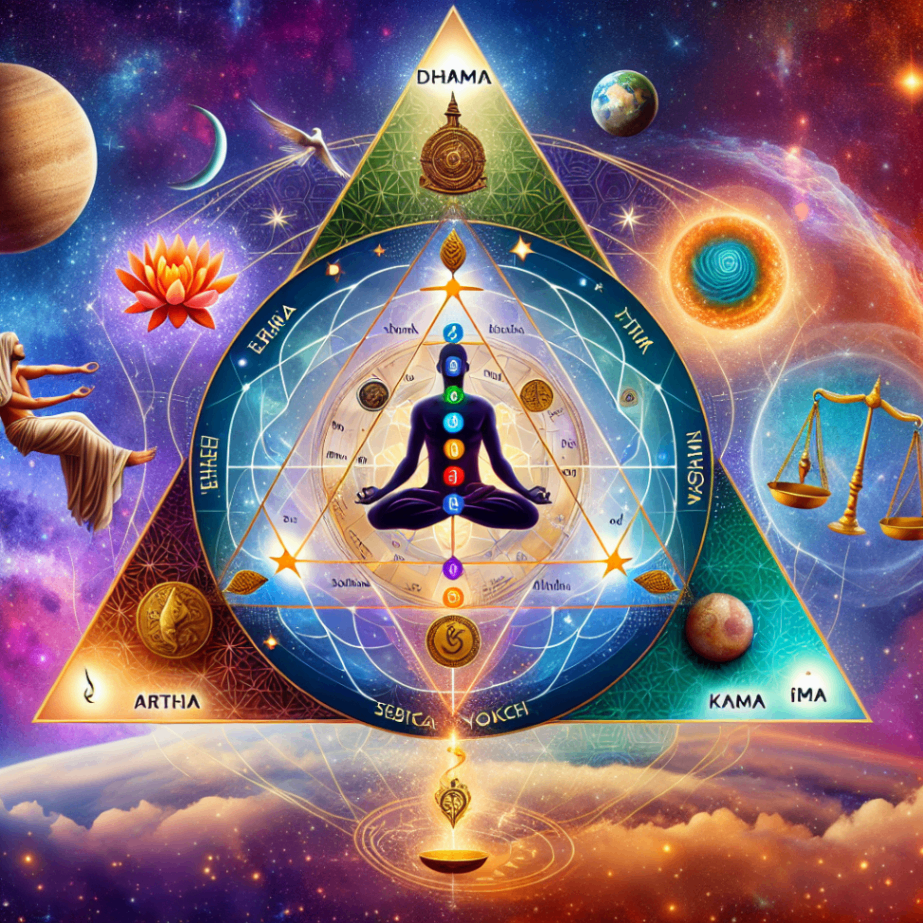Vedic astrology offers a profound framework for understanding an individual's life purpose by integrating the concepts of Purushartha (the four aims of human life) and Trikona (triangular formations in a horoscope) with insights from yogic sciences. This synthesis provides a multifaceted approach to interpreting one’s natal chart, revealing not only one's potential life directions and skills but also offering a path to personal fulfillment and spiritual enlightenment.
Exploring Purushartha: The Four Aims of Life
In Vedic philosophy, life’s endeavors are segmented into four primary aims, which dictate an individual's actions and motivations:
Dharma (Righteousness and Duty): Involves fulfilling one's ethical duties and responsibilities.
Artha (Material Prosperity and Wealth): Focuses on achieving financial stability and success.
Kama (Desires and Pleasures): Pertains to enjoying life and fulfilling personal desires.
Moksha (Spiritual Liberation and Enlightenment): Aims at achieving spiritual growth and ultimate liberation from the cycle of rebirth.
Understanding Trikona: The Triangular Houses
Each Purushartha is represented in the horoscope by specific triangular configurations of houses, known as Trikonas:
Dharma Trikona: Comprising the 1st, 5th, and 9th houses, highlighting ethics, education, and religious pursuits.
Artha Trikona: Involves the 2nd, 6th, and 10th houses, associated with wealth creation and career achievements.
Kama Trikona: Consists of the 3rd, 7th, and 11th houses, relating to fulfilling personal ambitions and social interactions.
Moksha Trikona: Includes the 4th, 8th, and 12th houses, focusing on emotional security, transformation, and spiritual liberation.
The planets residing in or ruling these Trikonas significantly influence the life paths individuals are likely to pursue, guiding them towards areas where they can best apply their innate capabilities and fulfill their potential.
Planetary Influences and Life Purpose
In Vedic astrology, the planets that reside in or rule the Trikonas (triangular formations in a horoscope) exert significant influence over an individual's inclinations, talents, and life path. Each planet's placement in these Trikonas reveals unique aspects of a person's life purpose, guiding them toward specific domains of personal and professional development.
Dharma Trikona (1st, 5th, and 9th Houses)
Jupiter: A prominently placed Jupiter in the Dharma Trikona often signifies a life oriented toward teaching, philosophy, or religious pursuits. Individuals with this placement are likely to be drawn to roles that involve guiding others, spreading wisdom, and moral leadership.
Sun: When the Sun occupies the Dharma Trikona, it emphasizes a life focused on personal authenticity and leadership. Such individuals are likely to pursue careers that place them in the spotlight, where they can make significant impacts on society through their originality and integrity.
Mercury: Mercury in this Trikona enhances communication skills, making it ideal for careers in writing, speaking, teaching, and disseminating knowledge. It suggests a life purpose connected with intellectual exchange and educational endeavors.
Artha Trikona (2nd, 6th, and 10th Houses)
Venus: Venus positioned in the Artha Trikona indicates a knack for attracting wealth and a career in fields that involve beauty, art, or finance. These individuals may excel in banking, the arts, fashion, or any profession that requires aesthetic judgment or financial acumen.
Mercury: When Mercury is found here, it often points to a career in commerce, finance, or analytical work where detail-oriented skills are prized. Individuals may be drawn to accounting, analytics, or entrepreneurial ventures.
Saturn: Saturn in the Artha Trikona can indicate a person whose life purpose is tied to mastering discipline and responsibility in their professional field. Careers might include administration, management, or any role requiring rigorous organization and long-term planning.
Kama Trikona (3rd, 7th, and 11th Houses)
Mars: Mars in the Kama Trikona propels individuals towards careers that demand courage, competition, and perseverance. This placement is common among athletes, entrepreneurs, and those in the military or other high-stakes professional environments.
Venus: When Venus resides in this Trikona, it enhances one's social appeal and skills, often leading to careers in public relations, counseling, or the entertainment industry, where personal interactions and networking are crucial.
Moon: The Moon in the Kama Trikona suggests a life purpose connected with emotional intelligence, nurturing, and public engagement. Careers might include psychology, nursing, or any role that requires caring for and understanding people's emotional needs.
Moksha Trikona (4th, 8th, and 12th Houses)
Saturn: Saturn located in the Moksha Trikona signifies a life devoted to understanding and managing life's deeper, more transformative forces. This placement is often seen in individuals who work in end-of-life care, psychology, or spiritual leadership.
Ketu: The presence of Ketu in the Moksha Trikona can indicate a mystical path, often leading individuals toward spiritual pursuits, metaphysical studies, or roles that involve dealing with the unknown or the subconscious.
Jupiter: Jupiter here expands the philosophical and spiritual dimensions of life, steering individuals towards careers in theology, metaphysics, or existential exploration, where they seek to understand the deeper meanings of existence and share these insights with others.
Each planetary placement within these Trikonas serves as a celestial guide, pointing individuals towards fulfilling their potential in alignment with their karmic blueprint. By understanding these influences, one can more effectively align their personal endeavors with their overarching life purpose.
Astrology and Life Purpose: An Intrinsic Connection
According to Vedic astrology, a birth chart encapsulates the direction, skills, and potential career paths of an individual. It postulates that true happiness and fulfillment stem from engaging in activities that align with these astrological indications. The challenges arise when individuals strive to pursue paths not highlighted in their charts, often leading to efforts that feel misaligned and unfulfilling.
The Role of Houses and Planetary Influences
The importance of specific astrological houses, such as the fourth house and its impact on emotional contentment, and the influence of the moon on how one perceives life’s events. The navamsa chart plays a crucial role in determining whether an individual feels their life has an inherent purpose, regardless of the hardships they may encounter.
For example, a robust navamsa with favorable Jupiter and Venus placements might indicate a sense of meaningful existence even in challenging circumstances, whereas difficult placements could lead to feelings of dissatisfaction despite outward success.
The Convergence of Career and Purpose
There is a distinct differentiation between career and life purpose in Vedic astrology. While one's career might align with their skills and astrological indicators, it doesn't necessarily fulfill their deeper purpose or ensure happiness. This dichotomy points to a fundamental issue where individuals equate professional success with personal fulfillment, which are not always correlated.
Integrating Yogic Sciences for Inner Fulfillment
Beyond the planetary placements and house configurations, the integration of yogic sciences—such as meditation and the study of sacred texts like the Yoga Sutras and Bhagavad Gita—plays a critical role in achieving inner peace and contentment. These practices help cultivate detachment and deeper self-awareness, allowing individuals to find happiness irrespective of their external circumstances.
Astrological Cycles and Life Purpose Dynamics
The concept of dashas, or planetary periods, in Vedic astrology indicates that life purpose can vary with time, governed by the activation of different areas of the chart. Each period may highlight specific themes or life lessons that are necessary for the soul’s growth at that time. Understanding these cycles helps individuals focus their efforts appropriately, aligning their actions with the cosmic timing indicated by their birth chart.
Relative and Absolute Purposes
Each individual has a unique role delineated by their karmic blueprint, but fulfilling these roles does not necessarily equate to fulfilling one’s absolute purpose, which transcends astrological indications. This ultimate purpose involves recognizing oneself beyond the cosmic roles played out in life, aiming to transcend the chart and live from a place of deeper existential awareness.
Living One's Truth
Living according to one’s swadharma (personal duty) is essential, yet it's equally important to engage in spiritual practices that liberate one from karmic ties and personal discontent. This blend of astrological guidance and spiritual practice empowers individuals to navigate life with greater peace and understanding, accepting their divine role while cultivating an inner sanctuary of contentment.
Practical Application and Self-Realization
Astrologers can guide clients to align their efforts with their dominant Trikona, facilitating smoother life journeys and aiding in the achievement of deeper fulfillment. By understanding and harmonizing with their planetary positions, individuals can navigate their existence with a clearer sense of direction, supported by the larger cosmic framework.
Conclusion
The detailed approach of Vedic astrology, enriched by the teachings of yogic sciences, offers valuable insights into navigating one’s life path. By understanding the intricate dance of Purushartha, Trikona, and planetary cycles, and integrating yogic practices for inner peace, individuals can lead a balanced and purposeful life, profoundly aligned with the cosmic order. This ancient wisdom not only maps out potential life paths but also empowers individuals to achieve profound personal transformation and spiritual liberation.



















